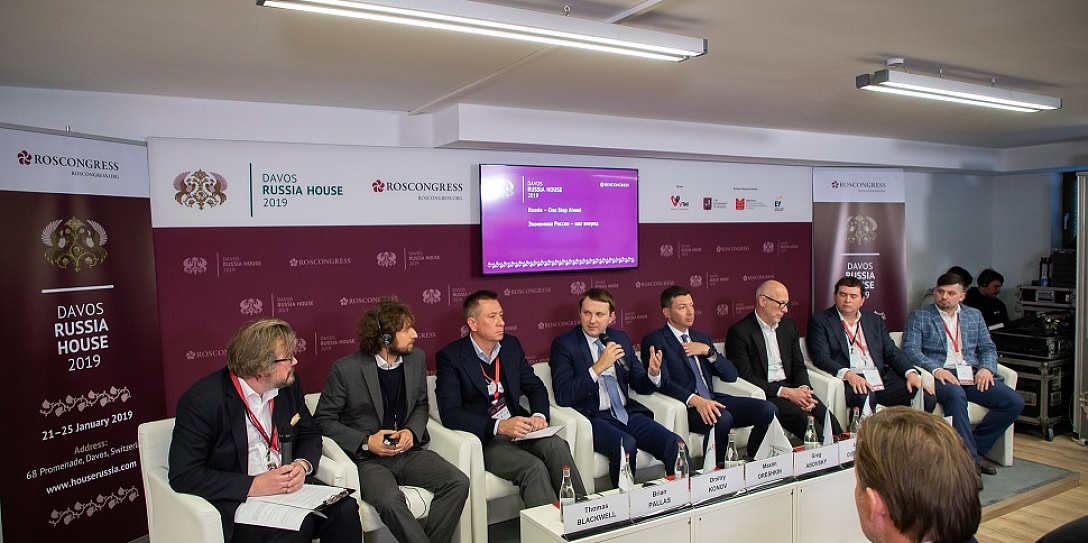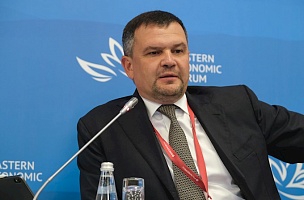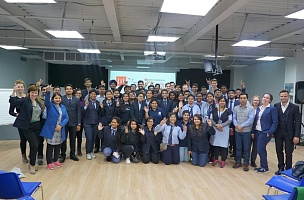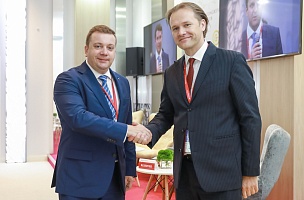Prospects and strength of the Russian economy lie not only in the wealth of natural resources and impressive results in the development of technological industries, but also in the significant potential for the development of human capital and increasing labor productivity
«We have much to be proud of in almost every industry. We have global leaders among tech companies. Rosatom, for example. The company is the acknowledged world leader in terms of nuclear reactors. There are many other technologies that exist in this field. Russia is building nuclear reactors in such countries as Turkey, India, Finland, and Hungary. All around the globe we participate in joint projects with Japan and other countries,» Maxim Oreshkin, Minister of Economic Development of the Russian Federation.
«Although Google came to Russia in the early 2000s, there is not a single market in the world, except Russia, where Google would not have won by now. The main reason for that is the strongest math education in Russia, our human resources, our people who exist within our environment, within Yandex culture, where they understand that each and every one of them has a chance to change something for the better in our people’s lives, in our users’ lives,» Greg Abovsky, Chief Operating Officer, Chief Financial Officer, Yandex.
«If you look at the basic macroeconomic statistics related to demographics, population dynamics and population structure, it becomes obvious that the extensive growth of Russia’s economy is not possible, therefore, growth can only be based on increased returns per each member of the workforce. Clearly that is only possible through using new technologies, increasing productivity and optimizing processes. This tech agenda is important not as something in and of itself, but important for each sector of the Russian economy, because only through this kind of move forward the entire economy of Russia will advance,» Maxim Oreshkin, Minister of Economic Development of the Russian Federation.
«When we were merging our taxi business with Uber, we communicated very closely with them, and it became obvious that our employees are responsible for the business as a whole, they understand the process all the way. As for our partners, our colleagues from Uber, each specific engineer had a very limited function. They only understand how particular components of the system work, but do not see the whole picture,» Greg Abovsky, Chief Operating Officer, Chief Financial Officer, Yandex.
«Our virtual assistant, Alice, which was released a year and a half ago, is a leading player in the Russian market as of today. It was the first Russian-speaking virtual assistant. Eight million people address Alice every day; 30 million people use the assistant every month. Today, 20% of all inquiries to Yandex are voice inquiries,» Greg Abovsky, Chief Operating Officer, Chief Financial Officer, Yandex.
«Yesterday, a Russian journalist from RIA Novosti came up to Tim Cook, the head of Apple, and asked him about his thoughts on Yandex.Phone. He said, ‘I have not heard about Yandex.Phone.’ I believe, very soon he will hear about Yandex.Phone and not only that,» Thomas Blackwell, Chief Executive Officer, Co-Founder, EM.
It is important for Russia to use the opportunities that arise under economic pressure from Western countries
«On one side, in the short term, it is clear that sanctions have an impact on the Russian economy, but on the other side, it creates the incentive for building an industry and creating ties with other countries that would have not been there otherwise. Although there is a short-term impact, there can be a longer term benefit,» Brian Pallas, Founder, Chairman of the Management Board, Chief Executive Officer, Opportunity Network.
Digitalization is finally no longer just a fashionable trend of tech companies, but it is now a reality for all sectors of the economy and public administration
«Even in the public sector, the technologies that we use are recognized in the world. For instance, the tax revenue service: the technological solutions implemented there serve as an example for many other countries. We even work with certain countries to share these technologies as a package for tax administration,» Maxim Oreshkin, Minister of Economic Development of the Russian Federation.
«It was about three years ago in Davos, when suddenly everyone started talking about digital disruption, transformation, the fourth industrial revolution, even the CEOs of industrial companies began to say those things. That was somewhat unexpected. I think they did it because their PR people and their IR people made them say that. But, nevertheless, it has now become an integral part of the agenda,» Tom Blackwell, Chief Executive Officer, Co-Founder, EM.
«Some people who are involved in digital transformation at SIBUR are not just specialists in digital technologies. They are high level specialists, with understanding of the process and with certain creative thinking,» Dmitry Konov, Chairman of the Management Board, SIBUR Holding.
«We see a huge number of industries that we can change, a huge number of products that we can create. And all of that is aimed at improving lives of our consumers,» Greg Abovsky, Chief Operating Officer, Chief Financial Officer, Yandex.
«We have gone a long way from traditional banking. Within the Tinkoff ecosystem users can now buy event tickets; we support travel bookings, and insurance, of course; we have an investment platform, we have a virtual operator. The whole ecosystem is, by and large, aimed at becoming a person’s assistant. We want to evolve into people’s guide to their lives, in a sense, to become the assistant that users trust,» Maxim Evdokimov, Chief Digital Officer, Tinkoff Bank.
Reduced regulation is key to the development of high-tech businesses
«We simply should not interfere [with the development of national champions], there is nothing else to do. They will manage on their own,» Maxim Oreshkin, Minister of Economic Development of the Russian Federation.
«The large role of government in Russia hinders the technology market, of course. In this sense, I am very pleased that Maxim [Oreshkin] said, „We will not interfere.“ Perhaps, that is a good message, in this sense. State capitalism does not stimulate innovation [...] And in the long-term, that situation must change in Russia, otherwise it is going to lag behind in this technology race,» Dmitry Alimov, Founder, Frontier Ventures.
«Sooner or later, no matter where it comes from — telecom, or high-tech, or fintech, or software — a comprehensive type of business will emerge. We still do not know what it is going to be called. The old ways, particularly the archaic regulation, when financial regulation applies only to financial institutions and banks, telecom regulation applies only to telecom companies — all of this will be a thing of the past. And we will figure out how to stimulate the development of this new type of business,» Andrei Dubovskov, President, Chairman of the Management Board, Sistema.
Russian companies are capable of fully covering the need for software on their own
«Mobile TeleSystems is the only company in our landscape that holds the entire software part on its shoulders. All companies buy the final product and implement it, they purchase billing systems and whatnot elsewhere. To date, MTS programmers have written around one hundred million lines of unique digital code. The entire billing system in all countries, all applications around — all of that was done with our own hands. We pay much attention to digitalization to make the properly good product,» Andrei Dubovskov, President, Chairman of the Management Board, Sistema.
It is important to see the many perspectives that the modern technology offers
«Many small or medium-sized companies emerge; the smaller companies that also bring up new ideas and new technologies within. It is important to understand that Russia provides opportunities and places for self-realisation,» Maxim Oreshkin, Minister of Economic Development of Russia Federation.
«One of the things that we realised is the strength of the Yandex ecosystem. That, and the fact that Yandex is a Russian company that allows our people to use Internet services that simply do not exist in other countries,» Greg Abovsky, Chief Operating Officer, Chief Financial Officer, Yandex.
«There are not so many industries that are really worth going into. Over the term of 10 or 20 or 30 years, there are industries that are complementary to such views on the development of civilization, not just a matter of making money or a matter of food security, or profitability, and so on. I believe that among them are genetic engineering, bioengineering, and, oddly enough, telecoms,» Andrei Dubovskov, President, Chairman of the Management Board, Sistema.
«Among the sectors that are in the scope of our interest is space industry. As Sistema corporation, we are still taking our first steps in this direction. Yet we have a considerable head start already,» Andrei Dubovskov, President, Chairman of the Management Board, Sistema.
Rethinking the potential of certain technologies and their place in economic development is in progress
«We all know Russia as a country rich in natural resources, oil and gas — everyone understands that. But perhaps not everyone in the world understands that technology plays such a big role in the country as well,» Tom Blackwell, Chief Executive Officer, Co-Founder, EM.
«People tend to overestimate what can be done in the short term, and underestimate what can be done in the long term. That is especially true of technology. Like with blockchain: we are now at the point where the technology is still highly attractive fundamentally [...] but now we see the rationalization in the market,» Dmitry Alimov, Founder, Frontier Ventures.
«As far as Russia goes, I believe that this [blockchain technology] is one of the opportunities that Russia has to make some kind of a technological breakthrough. The regulator plays a big role here. The US Securities and Exchange Commission is now quite cautious and conservative over the matters of regulation. Because of that, many projects are being launched in Asia. Thus, some have the opportunity to take the lead [...] If the regulation [of blockchain technologies in Russia] is favourable, it can be a powerful stimulation for that segment,» Dmitry Alimov, Founder, Frontier Ventures.
Problems
Advancing the Russian economy is impossible without developing the country’s human capital
«The main thing about the companies’ development and the creation of new technologies is, of course, human capital. Therefore, the role of the government is to ensure the high level of human capital supply,» Maxim Oreshkin, Minister of Economic Development of the Russian Federation.
«We are competing for people. Possibly, not so intensively now, but potentially it will only increase,» Dmitry Konov, Chairman of the Management Board, SIBUR Holding.
«The main ingredient for our success is human resources, of course. And this is where we certainly rely on the strongest mathematical education in Russia,» Greg Abovsky, Chief Operating Officer, Chief Financial Officer, Yandex.
«All math students, all graduates from Russian universities believe that Yandex is one of the best places to work at,» Greg Abovsky, Chief Operating Officer, Chief Financial Officer, Yandex.
«This agenda is the same for all. We all do more or less the same thing. In a situation when there are no out-of-box solutions, you cannot buy and plug, but you need to bring in your own people, who understand the process, understand the algorithm, understand the organization, and put each solution together,» Dmitry Konov, Chairman of the Management Board, SIBUR Holding.
Lack of cooperation between players in different markets
«The integration is both economic and political, in one way or another. We must be integrated with the West, with the East, with Africa, with Latin America. Without integration, having our 1.5% to 2% of global GDP, it is impossible to build a successful tech industry,» Dmitry Alimov, Founder, Frontier Ventures.
«As one of the technological and digital leaders, we now experiment a lot within our company; we do a lot of revolutionary things. But there is safety in numbers. It has to be this kind of large global narrative,» Maxim Evdokimov, Chief Digital Officer, Tinkoff Bank.
Solutions
Creating and using digital platforms that allow combining entrepreneurial potential both domestically and globally
«Digital becomes a part of everyday life, and every company in the country has a strong digital component. What really matters is how much this company can collaborate and build an ecosystem. The idea would be not to start from scratch, but to collaborate with other companies already in the system,» Brian Pallas, Founder, Chairman of the Management Board, Chief Executive Officer, Opportunity Network.
«It does not matter if you are in Moscow, in Tula or in New York, you should have access to the same possibilities of the global economy,» Brian Pallas, Founder, Chairman of the Management Board, Chief Executive Officer, Opportunity Network.
Profound restructuring of the training system is needed for the modern economy and the economy of tomorrow
«The task of the government is merely to help any person born in Russia to get an education and give them the opportunity to realise their potential and their abilities. Such opportunities exist, and that is very good,» Maxim Oreshkin, Minister of Economic Development of the Russian Federation.
«Our fundamental education is not very much aimed at creating skills and practices that are applicable in business. Graduates are very smart, but their brains must be properly applied, if we talk specifically about situations of going into business. Tinkoff recently launched a fintech school, which happens to be a very successful thing. It is not a university in a large sense; we train programmers, analysts, business technologists, not only for our own purpose, but generally. And we also compete with Yandex for being among the top of companies where people would like to be employed after they graduate,» Maxim Evdokimov, Chief Digital Officer, Tinkoff Bank.
«Perhaps, it would be fair to say that it is necessary to invest in people in a broad sense. This means change from the standpoint of educational processes, this means adjusting the work with people from the standpoint of HR processes. There is also a lot of disruption in the classic approach to human resource management. All of those things will be beneficial for us as well,» Maxim Evdokimov, Chief Digital Officer, Tinkoff Bank.
«Software, what my colleagues have just been talking about, and what they focused the attention on, is a complementary part of this industry. We do that too, of course. Out of the 75,000 people who now work at Mobile TeleSystems, about 5 or 6 thousand are graduates of those corporate education facilities that have been established by our colleagues. We have also established this kind of a corporate institute, we also train people to be programmers, system architects, analysts, testers,» Andrei Dubovskov, President, Chairman of the Management Board, Sistema.
«Despite the fact that many people are talking about digital transformation, disruption and everything that has to do with digital, and all the clever words that are being said, the most important thing that they forget about, is that, by and large, all transformation and disruption starts from people. Not from processes, not from technology, nor from hardware, nor from supercomputers, but from people. It is all in their heads. Change is in the heads. It becomes a headache, too. Greg [Abovsky] mentioned the good things, such as the math education, but unfortunately, it does not produce too many graduates, because it is already getting a bit crowded for all of us. All of us — meaning not only Yandex and ourselves, but other players as well,» Maxim Evdokimov, Chief Digital Officer, Tinkoff Bank.
«If you look closely at how all that happens, there are quite a few examples when large companies address those issues by building corporate universities, creating new personnel. Certainly, based on the traditional fundamental education and the mentioned education in physics and math, but focusing on business processes, nevertheless,» Maxim Evdokimov, Chief Digital Officer, Tinkoff Bank.
Information may be used with a mandatory link to the Information and Analytical System of the Roscongress Foundation.






